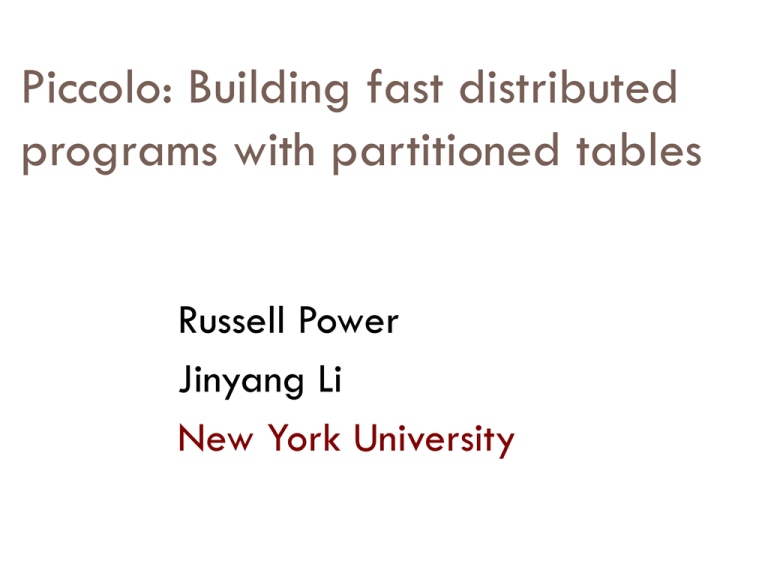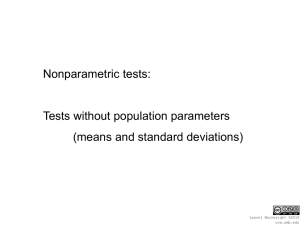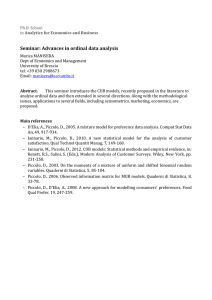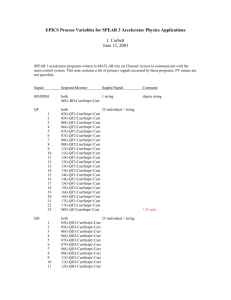Piccolo Presentation - Systems@NYU
advertisement

Piccolo: Building fast distributed
programs with partitioned tables
Russell Power
Jinyang Li
New York University
Motivating Example: PageRank
Repeat until
convergence
for each node X in graph:
for each edge XZ:
next[Z] += curr[X]
Input Graph
Curr
AB,C,D
A:
A: 0.25
0.12
0.2
0.17
B:
B: 0.16
0.15
A: 0.25
0
0.2
C:
C: 0.22
0.21
0.2
…
…
C: 0.22
0
0.21
BE
CD
…
Next
B: 0.17
0
0.16
…
Fits in
memory!
PageRank in MapReduce
Data flow models do not expose global state.
1
Graph stream
Rank stream
A:0.1, B:0.2
Distributed
Storage
2
3
PageRank in MapReduce
Data flow models do not expose global state.
1
Graph stream
Rank stream
A:0.1, B:0.2
Distributed
Storage
2
3
PageRank With MPI/RPC
Graph
A->B,C
…
1
User explicitly
programs
communication
Distributed
Storage
Ranks
C: 0
…
Graph
C->E,F
…
Ranks
A: 0
…
2
3
Ranks
B: 0
…
Graph
B->D
…
Piccolo’s Goal: Distributed Shared State
Distributed inmemory state
1
read/write
Ranks
A: 0
B: 0
…
2
Distributed
Storage
Graph
A->B,C
B->D
…
3
Piccolo’s Goal: Distributed Shared State
Graph
A->B,C
…
Ranks
A: 0
…
1
Piccolo runtime
handles
communication
Ranks
C: 0
…
Graph
C->E,F
…
2
3
Ranks
B: 0
…
Graph
B->D
…
Ease of use
Performance
Talk outline
Motivation
Piccolo's Programming Model
Runtime Scheduling
Evaluation
Programming Model
Implemented as
library for C++
and Python
x
read/write
Ranks
A: 0
B: 0
…
2
1
get/put
update/iterate
Graph
AB,C
BD
…
3
Naïve PageRank with Piccolo
curr = Table(key=PageID, value=double)
next = Table(key=PageID, value=double)
def pr_kernel(graph, curr, next):
i = my_instance
n = len(graph)/NUM_MACHINES
for s in graph[(i-1)*n:i*n]
for t in s.out:
next[t] += curr[s.id] / len(s.out)
def main():
for i in range(50):
launch_jobs(NUM_MACHINES, pr_kernel,
graph, curr, next)
swap(curr, next)
next.clear()
Jobs run by
many machines
Controller launches
jobs in parallel
Run by a single
controller
Naïve PageRank is Slow
Graph
B->D
…
Ranks
A: 0
…
get
put
1
get
put
put
get
Ranks
C: 0
…
Graph
C->E,F
…
Ranks
B: 0
…
2
3
Graph
A->B,C
…
PageRank: Exploiting Locality
curr = Table(…,partitions=100,partition_by=site)
next = Table(…,partitions=100,partition_by=site)
group_tables(curr,next,graph)
Control table
partitioning
Co-locate tables
def pr_kernel(graph, curr, next):
for s in graph.get_iterator(my_instance)
for t in s.out:
next[t] += curr[s.id] / len(s.out)
def main():
for i in range(50):
launch_jobs(curr.num_partitions,
pr_kernel,
graph, curr, next,
locality=curr)
swap(curr, next)
next.clear()
Co-locate execution with
table
Exploiting Locality
Graph
B->D
…
Ranks
A: 0
…
get
put
1
get
put
put
get
Ranks
C: 0
…
Graph
C->E,F
…
Ranks
B: 0
…
2
3
Graph
A->B,C
…
Exploiting Locality
Graph
B->D
…
get
Ranks
A: 0
…
put
1
get
put
put
get
Ranks
C: 0
…
Graph
C->E,F
…
Ranks
B: 0
…
2
3
Graph
A->B,C
…
Synchronization
Graph
B->D
…
Ranks
A: 0
…
put (a=0.3)
Ranks
C: 0
…
Graph
C->E,F
…
1
How to handle
synchronization?
put (a=0.2)
2
Ranks
B: 0
…
3
Graph
A->B,C
…
Synchronization Primitives
Avoid write conflicts with accumulation functions
NewValue = Accum(OldValue, Update)
sum, product, min, max
Global barriers are sufficient
Tables provide release consistency
PageRank: Efficient Synchronization
curr = Table(…,partition_by=site,accumulate=sum)
next = Table(…,partition_by=site,accumulate=sum)
group_tables(curr,next,graph)
def pr_kernel(graph, curr, next):
for s in graph.get_iterator(my_instance)
for t in s.out:
next.update(t, curr.get(s.id)/len(s.out))
def main():
for i in range(50):
handle = launch_jobs(curr.num_partitions,
pr_kernel,
graph, curr, next,
locality=curr)
barrier(handle)
swap(curr, next)
next.clear()
Accumulation
via sum
Update invokes
accumulation function
Explicitly wait
between iterations
Efficient Synchronization
Graph
B->D
…
Ranks
A: 0
…
Ranks
C: 0
…
Graph
C->E,F
…
1
put
(a=0.2)
update
(a, 0.2)
2
Runtime
computes sum
Workers buffer updates
locally
Release consistency
put (a=0.3)
update
(a, 0.3)
Ranks
B: 0
…
3
Graph
A->B,C
…
Table Consistency
Graph
B->D
…
Ranks
A: 0
…
Ranks
C: 0
…
Graph
C->E,F
…
1
put
(a=0.2)
update
(a, 0.2)
2
put (a=0.3)
update
(a, 0.3)
Ranks
B: 0
…
3
Graph
A->B,C
…
PageRank with Checkpointing
curr = Table(…,partition_by=site,accumulate=sum)
next = Table(…,partition_by=site,accumulate=sum)
group_tables(curr,next)
def pr_kernel(graph, curr, next):
for node in graph.get_iterator(my_instance)
for t in s.out:
next.update(t,curr.get(s.id)/len(s.out))
Restore previous
computation
User decides which
tables to checkpoint
and when
def main():
curr, userdata = restore()
last = userdata.get(‘iter’, 0)
for i in range(last,50):
handle = launch_jobs(curr.num_partitions, pr_kernel,
graph, curr, next,
locality=curr)
cp_barrier(handle, tables=(next), userdata={‘iter’:i})
swap(curr, next)
next.clear()
Recovery via Checkpointing
Graph
B->D
…
Ranks
A: 0
…
Distributed
Storage
Ranks
C: 0
…
Graph
C->E,F
…
1
Runtime uses
Chandy-Lamport
protocol
Ranks
B: 0
…
2
3
Graph
A->B,C
…
Talk Outline
Motivation
Piccolo's Programming Model
Runtime Scheduling
Evaluation
Other workers
are updating P6!
Load Balancing
J1,
J2J1
P1, P2
P1
J3,
J4J3
J5,
J6
J6
P3, P4
P3
P5, P6
P5
P6
1
2
J3
3
J5
Pause
updates!
Coordinates
workstealing
master
Talk Outline
Motivation
Piccolo's Programming Model
System Design
Evaluation
PageRank iteration time
(seconds)
Piccolo is Fast
Main Hadoop Overheads:
Hadoop
Sorting
Piccolo
HDFS
Serialization
NYU cluster, 12 nodes, 64 cores
100M-page graph
1 billion page
graph
Piccolo Scales Well
PageRank iteration time
(seconds)
ideal
EC2 Cluster - linearly scaled input graph
Other applications
Iterative Applications
N-Body Simulation
Matrix Multiply
No straightforward
Hadoop
implementation
Asynchronous Applications
Distributed web crawler
Related Work
Data flow
MapReduce,
Tuple Spaces
Linda,
Dryad
JavaSpaces
Distributed Shared Memory
CRL,
TreadMarks, Munin, Ivy
UPC, Titanium
Conclusion
Distributed shared table model
User-specified policies provide for
Effective
use of locality
Efficient synchronization
Robust failure recovery
Gratuitous Cat Picture
I can haz kwestions?
Try it out:
piccolo.news.cs.nyu.edu








